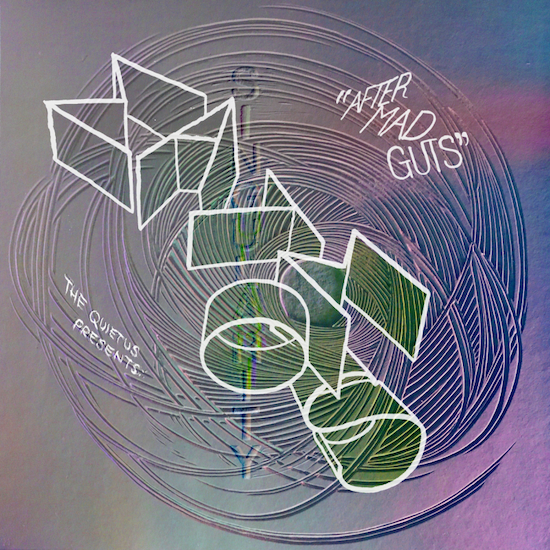To receive the Matmos Singularity track ‘After Mud Guts’ become a Quietus Sound & Vision subscriber
“Sometimes you want a cream of tomato soup and sometimes you want a tangy ceviche with lime juice. This is more on the lime juice spectrum”, says Drew Daniel, one half of Matmos. “Sometimes you want a mouthful of rocks”, adds Martin ‘M.C.’ Schmidt sardonically. The pair are describing their longform Singularity track ‘After Mud Guts’, a piece based on musique concrète concepts which traces the band’s personal and musical history.
They are in their Baltimore home – where they’ve lived since 2007 after moving from San Francisco – when I speak to them over Zoom. They’ve been partners and musical collaborators for several decades – you can tell by the way they frequently finish each other’s jokes, talk over each other and share the same kind of goofy humour. They’re also tireless sonic innovators, constantly finding new ways of turning the most banal sonic sources, such as discarded bits of plastic or ageing washing machines, into fertile creative starting points.
Their 17-minute Singularity track, which features dozens of sliced up samples and field recordings, including snippets from their travels as well as from cheesy 90s pop tracks, was a return to their creative origins as a band, as Daniel explains. “For years, I’ve enjoyed making little knotted-string collages. The very beginning of this band was Martin and I cutting up sounds in a musique concrète style, in a piece of software called Sound Edit”, he says. “We would sit for hours and make little edits. It was like a single sound and then another sound and then another sound. We were very inspired at the time by hearing early tape music, pieces like Articulation by [Hungarian-Austrian avant-garde composer György] Ligeti – the high modernist movement of abstract sound.”
But the duo’s obsession with cutting up sound in unusual ways also came from more local sources of inspiration. “Our difference was that it was often cartoonish and funny”, continues Daniel. “There’d be pieces of Barbarella and Snoopy’s stomach ache growls from a Charlie Brown animated special. And at the same time, I was listening to a lot of hip hop and the beginnings of what became breakbeat techno and then jungle. That made me interested in turntablism.” As they began to immerse themselves in the burgeoning Bay Area hip hop scene, one record in particular proved to be pivotal. They were driving through California one day, on their way to see Schmidt’s parents when they stopped off at a record store in the small town of San Bruno, close to San Francisco. “There were these amazing people scratching and their skills were stupendous. It was mind-blowing”, Daniel recalls. They ended up buying a stack of breaks records, designed for DJs to scratch with.
One of these was called Battle Breaks, a 1992 release by the Psychedelic Scratch Bastards. “It had a piece called ‘Mud Guts’, that was 20 minutes long, that was just one noise after another. It was like guitar stabs, dialogue from movies, little breaks, but they wouldn’t loop, it would just be one noise. We thought it was so hilarious and dense and beautiful and rhythmically alive. It seemed to square some kind of circle, like a functional record for turntablists to scratch with in a battle context, but it also felt to us a lot like Ligeti or Pierre Henri or other highly abstract musique concrète works, in that it was just relentless weird noise after weird noise.”
With ‘Mud Guts’ serving as the inspiration, the pair went to work unearthing decades worth of recordings, from their own performances, from conversations and jam sessions with friends, and from travels around the United States and further afield. These included recordings from a castle, made during an artist residency at Civitella Ranieri, an art foundation in Umbria, Italy. “We were in this tunnel. Literally a crypt under a chapel in a castle. And it was fucking disgusting. Terrifying!”, explains Schmidt. “It was really dirty. Mud and cobwebs and spiders and graves”, continues Daniel. “So the first three minutes are just stuff from that castle. There’s suits of armour and cisterns and chalices from the chapel, and the piano and the organ. That’s like a Scooby Doo haunted house part, and that ends when you hear my voice say, ‘There’s a lot of spiders in here!’”

The result is a piece of music that is both highly abstract, intensely personal, and shot through with bursts of absurd humour. It also acts as a kind of sonic catalogue of the duo’s career. “It’s sort of like going to the library and just reading the spines of books, and then leaving”, is how Schmidt puts it. Yet the editing process, which was mostly done by Daniel on Ableton and Digital Performer, was both painstaking and somewhat haphazard, leaving much up to chance. “He edits while we watch movies”, Schimdt explains. “Yeah, I’ll sit and make a cutup that I don’t listen to”, Daniel adds. “He just looks for waveforms. He’s not kidding”, continues Schmidt. “Yeah it’s just circumventing control”, says Daniel. “Because so much of music software design is about giving you absolute control over every aspect, [but] what happens if I’m not entirely in control? What if I’m in control of the timing but not the texture? Then you can get results that are not conscious expressions of your intent, but they’re interesting to bounce off.”
The pair admit that while this approach can bring interesting results, it can also be challenging, even a bit tedious for the listener. “I think this piece is really annoying, but I had so much fun making it. I am a little concerned that for other people it’s kind of exhausting”, says Daniel. Yet the track, like its Battle Breaks forebear, has a certain kind of functionality that means it can be put to all kinds of different uses, such as being sampled by other musicians. “This is basically a Matmos sample kit. We’re not calling it that but you could make a record out of the first three minutes of this, because it’s so many stabs of different instruments”, says Daniel.
But while the track may not be a straightforwardly pleasant listening experience for all, that is precisely the point, at least for Schmidt. “I no longer want perfume music, where it’s like, ‘Yeah this is great and it takes me and just flows.’ I’ve listened to so much fucked up music, that when I cook, I’m like ‘Alright, I’m going to listen to some musique concrète’. This is perfect, because life, especially for the last couple of years, is already so clockwork.” Daniel concurs on the need for sounds that shake the listener out of default states of being: “I think of that kind of ‘return to the womb, you’re safe’ ambience. And I think there’s valid reasons to seek that out, if that’s what you want, and plenty of people are doing that, and doing it well. But that’s not what this is. This is the opposite.”
To receive ‘After Mud Guts’ by Matmos, as well as a host of other benefits including exclusive essays, podcasts and playlists, and loads more specially-commissioned music, become a Quietus Sound & Vision subscriber. You can do so here




